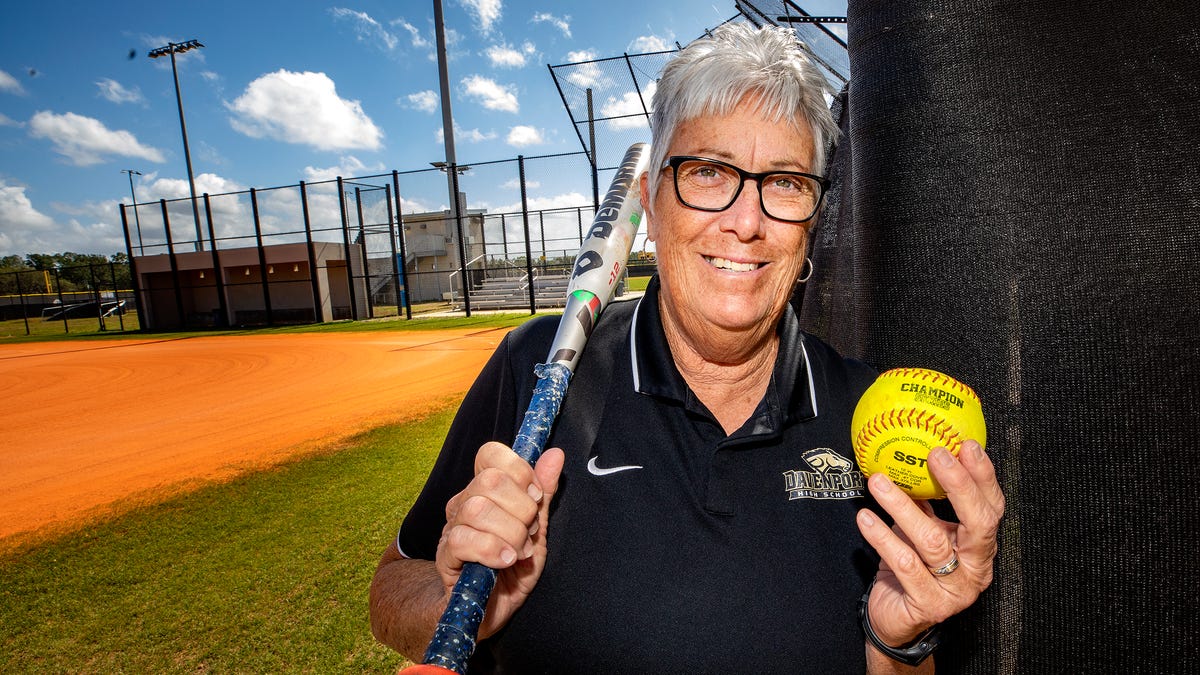Sports
Sonia Cook has impacted high school girls sports for 40 years — and will continue to do so

Two-Minute Drill: The Miami Grand Prix is here; Last word on NFL Draft
The Miami Grand Prix will be run for the third time in South Florida with festivities beginning May 3. Plus the state welcomed 23 NFL Draft picks.
Sonia Cook had it all planned out. She was going to retire as a coach last year — there even was a retirement celebration at the softball park where many former players showed up — then just teach this past school year to complete 40 years as a teacher. And when she was gone, there was no doubt she would be missed.
Then she had a change of heart and decided to coach Davenport’s softball during her final year. This was going to be a column on her retirement, but … well … she’s not going anywhere — at least for now.
There’s no doubt that she’s meant a lot to her players, who raised money to send her on a cruise to Alaska. And the many posts from former players on the Facebook page that was created to honor Cook about how much she meant to them rekindled her passion for coaching. With changes in the DROP program that extended it from five to eight years in attempt to retain teachers, Cook, an Alabama native, decided recently to return to Davenport as a P.E. teacher. She also will softball coach for at least another year.
Coaching Legend: David Saliba’s baseball legacy in Polk County hasn’t slowed down after four decades
Sheesh — how can we miss you if you won’t go away. And to be sure, Cook will be missed when she finally decides to retire for good.
Cook is one of the pioneers of fastpitch softball in Polk County and in high school girls sports in general. When she arrived at Winter Haven 40 years ago, there was no girls soccer, no girls weightlifting, no fastpitch softball, no girls golf, no competitive cheer, no girls weightlifting, not girls lacrosse, no beach volleyball, no flag football, no girls wrestling. Girls ran track or cross country and played basketball, tennis or volleyball and that was about it.
At Winter Haven, she started out coaching volleball and also coached basketball briefly. A slowpitch softball at USF, Cook joined Pete Harris’ group that pushed the FHSAA to add fastpitch softball. When the sport was added for the 1986-87 season, Cook started Winter Haven’s fastpitch softball program, one of three programs she started in Polk County. She started the Ridge Community program when the school opened in 2005 then started Davenport’s program when the school opened three years ago.
Cook, who coached Polk State from 2000 to 2005, is one of three coaches from first years of fastpitch softball still coaching the sport, although all had a break. Bartow’s Glenn Rutenbar returned a few years stepping away for four years, and Nancy Denton, who started Lake Wales’ program then retired after the 2015 season, returned as an assistant a few years ago.
So in just softball, she’s seen the growth of the sport, remembering how in the first year in 1987 when only Polk and Hillsborough played fastpitch during the regular season but had to play slowpitch in the postseason. In the county tournament that year, the Polk teams switched to slowpitch to get ready for the district tournament. She remembers having to move her first baseman to pitcher because her pitcher couldn’t make the adjustment from fastpitch to slow pitch.
“Needless to say, all the Polk County teams struggled a little bit with obviously the pitching difference,” she said. “It was like hitting change-ups all day.”
Her Winter Haven thrived in the early years with a strong feeder system from the rec leagues, and she coached with the late Jack Vogt when he started the first travel ball team in Polk County, the Polk County Rebels, in the late ’80s.
“I learned so much from him,” Cook said. “Coaching with Jack for a couple of summers really made a difference in helping me see how teams developed players as far as their fastpitch skills.”
Her Winter Haven program thrived in the ’90s as consistently one of the top teams. There was such a wealth of talent that even after Lake Region opened for the ’95-’96 school year and took such standouts as April Elston, Kara Kleibl and Heather McCrimmon, all top players on Lake Region’s first state championship team in 1998 as well as the runner-up team in ’97, Winter Haven remained one of the top teams. Her Blue Devils had final four potential with players like Dani Risinger, future North Carolina standout Tiffany Tolleson, Kristin Reass, Laura Beckert, Kim Harvey, Ann-Marie Granger and Amanda “Monk” Willard, among others.
“I had a stud of a team, but they took half of my great players and of course (Phil) Chewning comes over (to Lake Region) with his daughters and puts them together with my players and wins a state championship,” Cook said.
Despite great talent, the Blue Devils were a bit snake-bitten during that time as they would come up against Lake Wales, Bartow or Lake Region and could not break through to the final four. In 1995, for example, Kelly Varnadore pitched a gem in the district semifinals but still lost to Bloomingdale, which boasted one of the top pitchers in the state.
The hardest loss was in 1998. Winter Haven was on the verge of beating Bartow in the regional semifinals. The Blue Devils were leading 4-1 in the bottom of the seventh inning when Tolleson made a shoestring catch but couldn’t complete a game-ending double play with a wide throw to second. Bartow then rallied with two outs.
“That’s part of getting out there and playing the game,” she said. “You never know what’s going to happen.”
She benefitted from multi-sport athletes that Winter Haven had at the time. Still coaching volleyball, she took the Blue Devils to the region finals in back-to-back years with softball standouts Tolleston, Reass and Beckert leading the way. Winter Haven lost to Cardinal Gibbons in both years.
Although not getting to the state tournament might be disappointing, Cook still gets her greatest thrill in the teaching aspect of coaching, especially when she the players learn what she’s trying to pass on. For instance at Davenport this year, she told the players that on bunts, there often won’t be a defender at third base, so the runner on first needs to be alert and taken advantage by going to third. When that happened in a game, the player got excited she went from first to third on a bunt.
“She never slowed down and went all the way to third standing up,” Cook said. “She said, ‘Coach, I’ve learned something, I’ve learned something.’ I said, ‘Yes, you did. Good job.’”
Most of her coaching career has been at the high school level, but she left Winter Haven in 2000 to take over at Polk State. After five years at Polk State, she came back to the high school game to start Ridge’s program.
“It was a hard decision to decide to leave, but I always wondered if I had the knowledge and skill to coach at the college level,” she said. “I really didn’t want to leave Polk County. … The reason I left Polk and came back to high school, I missed teaching the game. College is so much about out recruiting.”
Cook was a different coach when she started Ridge’s program as compared to when she started Winter Haven’s.
“The first game of high school fastpitch softball I ever saw, I coached,” she said. “I went through college playing slowpitch. I was smart enough to get an assistant coach who was a fastpitch catcher, and she really helped with the transition.”
Cook has seen tremendous changes in athletics, especially the explosion of travel ball, which has been good for the sport but not all good.
“There are some players who will spend more money doing travel ball, doing lessons and doing all that than what the college scholarship they’re working for would be equal to,” she said. “If you add all the hotel, gas, food, hotel, lessons, uniforms and equipment, they’re spending more than what the scholarship is going to be worth.”
And there also is the burnout factor.
“When I was at Polk State, I had kids who would come to me and say, ‘Coach, all I’ve done all my life is play softball since I was 10 or whatever, and my parents were like, get a scholarship, get a scholarship, get a scholarship,’” Cook said. “And they go, ‘Now that I’ve got it, I have nothing to work for and I don’t enjoy the game anymore.’ So they would give up their scholarship. Some of them would stay in school but wouldn’t even play. So I have seen there is a lot of burnout and a lot of overuse injuries. They’re using the same muscles all the time.”
The volleyball-softball athlete used to be common. Athletes like Reass and Tolleson, who both also played soccer, would be first-team, all-county players in multiple sports. Now players like them or more recently are rare.
Cook said she played volleyball, basketball and softball growing up.
“You’re using different muscles when you play different games,” Cook said. “They pushed these kids to specialize and you get arm issues, knee issues.”
After all these years, Cook thought she was ready to call it a day. But the players who meant a lot to her and to whom she meant a lot, caused her to change her mind.
“I just told them on Facebook, you guys motivated me again,” she said. “You rejuvenated me. I’m staying with it because I enjoy the players, I enjoy the sport.”
And she enjoys coaching the young players on Davenport, which was one reason back in the ‘90s that despite a desire to lighten her load and give up coaching volleyball, she kept going back.
So Cook will continue to impact girls sports in Polk County, something Winter Haven athletic director LeDawn Gibson saw first hand. Gibson played basketball for Cook in the ’80s at Winter Haven and was an assistant volleyball coach for a few seasons in ’90s. She knows what Cook has meant to high school girls sports.
“She’s meant a lot because she has impacted a lot of lives through different sports,” Gibson said. “Coach Cook, I mean she’s just an icon because, you know she’s a great coach, and she’s a great person. Even when I coached with her, she gets the best from her kids. She always got the best from her kids. She didn’t let them come in and half for or I think I’ll do this. No, Coach Cook didn’t play that. It was you give me everything or none, and she always got the best from it. And then she made it fun.”









/cdn.vox-cdn.com/uploads/chorus_asset/file/24100829/226345_Nest_Doorbell_wired_JTuphy_0006.jpg)
